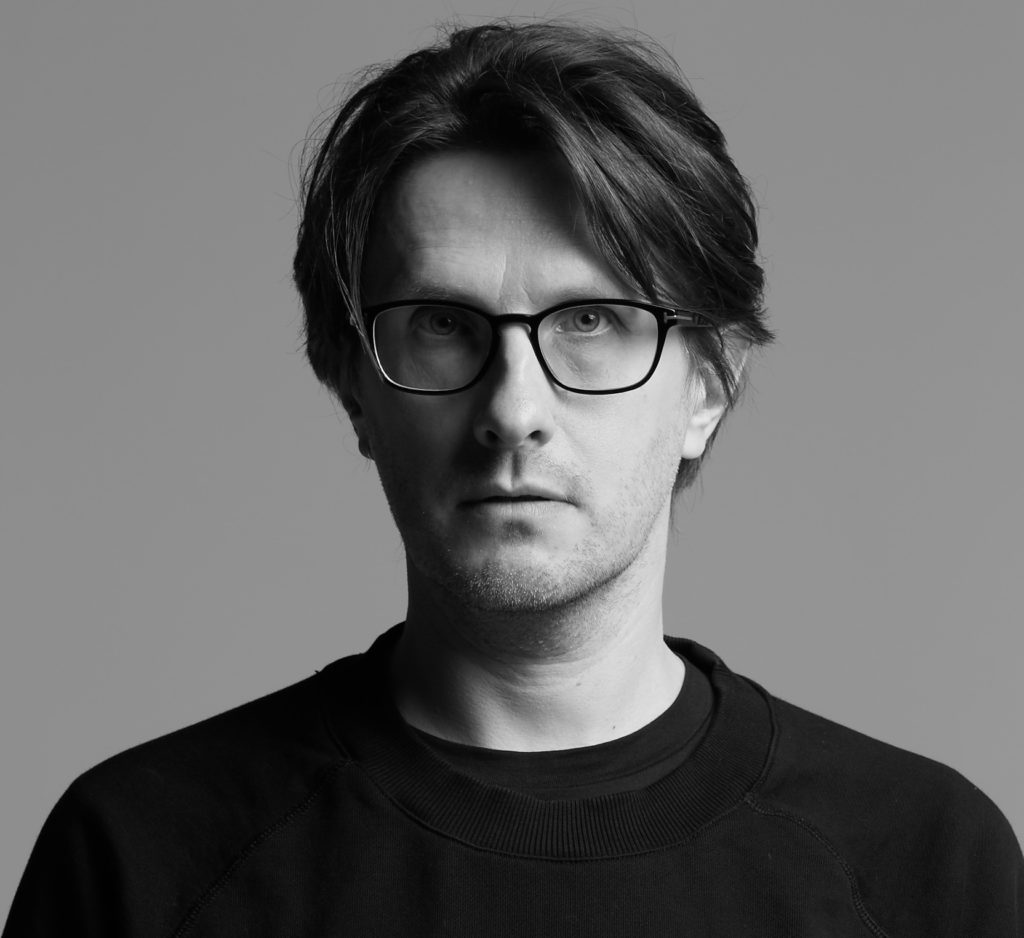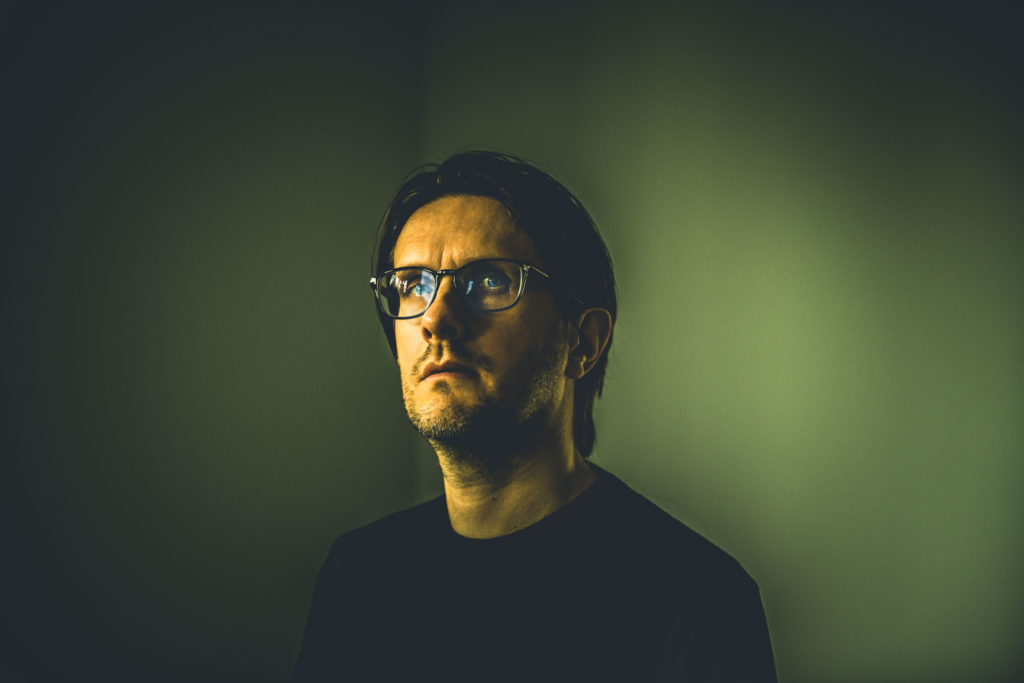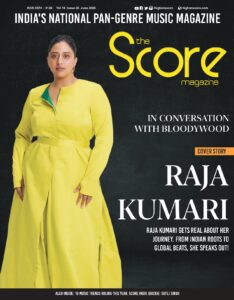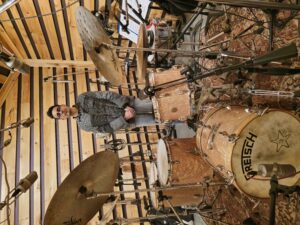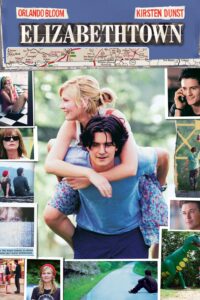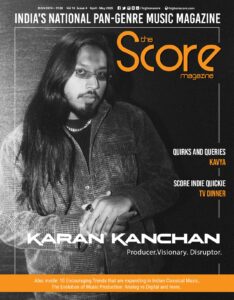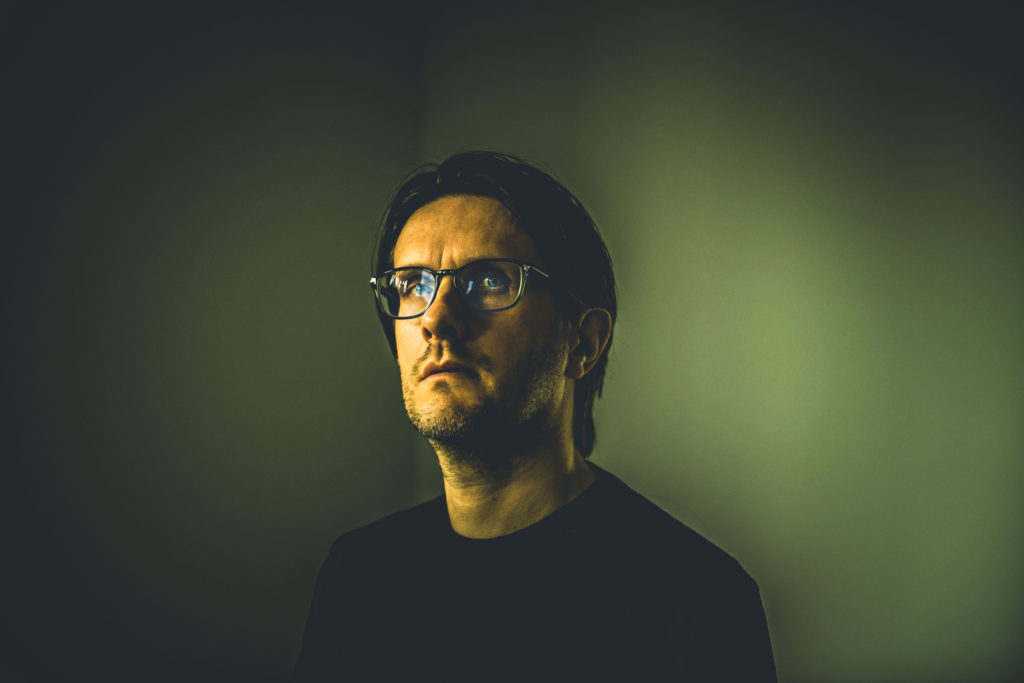Prog-rock demigod Steven Wilson is bafflingly predictable in his unpredictability. While he has been recognized for his relentless experimentation throughout his 25 year long career, his more recent solo ventures have seen this master of melancholia branch between various musical guises faster and with more layered absorption.
In his newest album The Future Bites, Wilson grounds his sound in the present. He chisels narratives out of electronic avantgardism, and tells both ominous and amusing stories with a dark playfulness that remains his signature.
Catching up with The Score Magazine, he muses on artistic insight, his bewilderment with this arriving-somewhere-but-not-here world, and his fascination with a £140 brick.
What have been the greatest challenges in your first decade as a solo artist?
For me, the main idea to be a solo artist was to be able to change direction much more easily. When you are in a band, you can’t reinvent yourself in the same way because everyone has to agree. To get everyone to agree to the styles is very difficult.
I started my career as a solo artist. Porcupine Tree was a solo project before it became a band. So going back to being a solo artist, the main challenge was to confront the expectations of fans. What really excites me is to do different things like working with different people.
With social media, everything I do is subjected to immediate feedback. Some of this feedback can be negative as much as it is positive. The biggest challenge for me is to ignore that and only do what I need to do to be myself.
You mentioned in an earlier interview that the album was finished right before the pandemic descended. Has your artistic perception of the already completed album changed because of 2020, then? Is there something you wish you had done differently in hindsight?
In many ways, there is an irony here. The Future Bites, in a way, feels more relevant now. It was written and recorded before the pandemic. It seems that the future is biting even harder than when I wrote the album.
When I wrote the album, we had the whole Brexit situation going on here, and there were a lot of changes happening, and I feel the situation has only become worse now. In many ways, The Future Bites seems even more topical now.
I am one of those people that can’t stop playing around. There is always an element of me that wants to do things differently.
How do you ensure that despite changes in sound from one album to another, the music essentially still sounds like you?
The answer to that is that I don’t know. I have kind of come to understand that myself because for many years I have not been confident in myself especially as a singer. When you look in the mirror, you very rarely see what others would probably see which is essentially your personality and charisma.
For many years, I wasn’t aware of myself having a strong musical personality. It didn’t matter what type of music I was doing. There was always something that would sound like me.
Basically, I would be making new material and thinking to myself that it sounds so different and when I start playing to people around me, they would shrug and say “Well, it sounds like you”. I used to find that annoying but now I have understood that it’s a good thing that, whatever I do there is something quintessentially Steven Wilson about it. I have started to embrace it now.
You mentioned that The Future Bites is an album that could only exist now, in the current time. Could you elaborate on that?
I think some of my previous albums have been guilty of sounding too nostalgic, for example my last album “To The Bone”, there was a sense of the 80’s experimental pop.
With the album “The Future Bites”, I wanted to make a record that sounds like it could only be made now. I think I achieved that and that’s why I feel it is quite a breakthrough record.
When transitioning to the primarily electronic sound of The Future Bites (2020), how have things changed in terms of your mindset, how you see the world, where you get ideas from, etc.?
I think I had to acknowledge to myself that I live in an electronic world. I think something that we all need to acknowledge to ourselves. When I grew up in the 80s and 90s, a lot of music was rock. I liked electronic music too but I gravitated towards playing the guitar and became a rock musician.
I believe that the one major thing is that we don’t live in that world anymore. We live in a world that is surrounded by electronic sound whether it is coming from our laptop or phone or even our door bell.
We are constantly bombarded by electronic sound and this is the musical vocabulary that young people understand. The guitar is an alien sound to them. My kids who are 9 and 10 don’t know what a guitar sounds like.
Working with that musical palette was a challenge for me but I embraced it because I always liked electronic music. I have not always been brave enough before now to completely immerse myself in that world.
But this time around I was absolutely adamant that it had to be a record that reflected the times that we live in. In order to reflect that, it had to be an album with an electronic sensibility. There are still guitars on this record but overall the record leans towards the electronic aesthetic.
I know you’re a longtime David Bowie admirer. Did he come to mind when you were dabbling in this album’s electronica? In the same vein, are there any modern pop artists that interest you? Also, did you draw any influence from your music with No-Man?
The reason Bowie, for me, is an icon is because of the way he conducts the expectations of the audience or not be afraid to disappoint your audience by doing something that they are not expecting.
He was the king of that! One minute he is a glam rocker, then he is a folk singer, then he is a solo singer and then he made the Berlin Trilogy which is dark, experimental European music which I think is a reference for so many people working in Pop music.
He then reinvented himself in the 80s with the big stadium pop music. For someone to be able to do that consistently and in such a short period of time, I think he is almost unprecedented. To me, he is a constant inspiration in that sense to be brave and change direction. I think it is important for artists to please themselves and not to please listeners.
So, for the first time we’re getting a Dolby Atmos mix of a Steven Wilson album. You also mentioned that you are remixing all your music at home in Atmos. How did you come to this new mode of mixing from the 5.1 mix? And could you take us through the production journey for The Future Bites?
For the second time in a row, I worked with a co-producer, a guy called David. He is someone who I have followed for many years and admired. What I love about his production is that he has a great understanding of the history of music; it is very contemporary and fresh.
Working with someone like David was very important. It was the most solo album I have made in the sense that I have played most of the guitars, bass and keyboards so there wasn’t so much of a band involved in this album. That was also a conscious decision because the album was going to be electronic. I wanted this album to be streamlined and fresh.
The Dolby Atmos was an extension of something that I have been doing for many years which is my interest in surround sound. I have been making music in 5.1 sound and I understand that a lot of people don’t get what that is.
5.1 is basically when you have two speakers in front of you, two speakers behind you, one speaker in the middle and the .1 is a low frequency. Dolby Atmos is the next step up from that and the standard is 7.1.0 which means that instead of five speakers, you now have seven.
For the first time, someone like me can not only spread the music in a horizontal way but also a vertical way. For an album like this, with a lot of details, this was a very immersive experience.
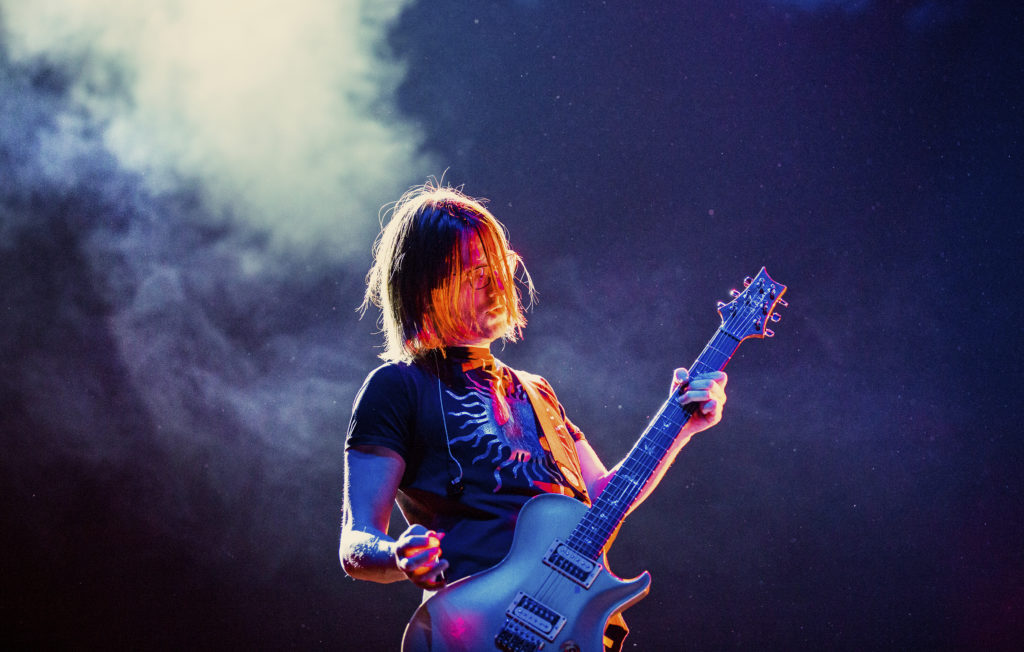
You said that you think the most powerful people in the world right now are those who write algorithms and persuade us to do things online. Does that idea scare you, amuse you? How did it become a conceptual pivot for The Future Bites?
There were a couple of themes I was interested in exploring. The idea of self and identity has changed in the era of social media. We all have a mirror of social media which means that we get immediate feedback to any music, opinion, belief etc. I think that has created a world of music for more narcissistic people which includes myself as well.
We are all more self absorbed. I think before the internet, we used to look at the world with curiosity and now we look at the little screen to see how many comments our Facebook or Instagram post has received. It’s fascinating to see how much the Internet has changed the world in an incredibly short period of time and a lot of those ideas went into the album.
Another thing that the album pivots on is the idea of consumerism and the fact that our internet footprint is constantly being analysed and the data is being used against us to buy things, to watch things, to believe things, to listen to things. It is framed in a positive way that our life is made easier by being recommended things that you like to purchase but there is another insidious side to it.
I see an increase in belligerence and the way people take extreme views. I think the internet and social media and algorithms feed into that. They present to us a world that we already know and that is not the purpose of life. The internet tends to analyse and give us things that we already know and believe in.
In our current world, it is common for people to have large parts of their life on the cloud, and not own any of it – like music, movies, etc. What are your thoughts on that?
I miss the world where I could go around to a friends house. I would be able to look at their record collection, look at their DVD collection, the photographs on their wall and I can understand a lot of things about the person without even talking to them just by looking at the things they surround themselves with.
Those days are going and now we live in the world where arguably you can have your whole life in a cloud and there is no sense of defining your personality through the things you choose to surround yourself with.
I understand that the human race is evolving and things change all the time, but I can’t help feeling that it is sad. The part of being a human being is to surround yourself with things that almost identify you – whether you are a collector, or you like to buy movies, or teapots.
It’s a shame that now people have their whole world in a cloud. I still like to collect records and I can’t listen to music unless I can hold it in my hand. I am not even a Spotify user. I understand that it is a wonderful resource for the discovery of music but personally if I want to listen to music, I want to be able to hold it in my hands and have a tangible relationship with the music.
You mentioned that your approach to the album’s design is based on people’s consumerist tendency to buy/keep things that are essentially useless – like a Virgil Abloh brick. Could you elaborate on that?
Something which is very prevalent in this world is that we like to buy. As a species, we all love to go shopping and purchase things. I have a bit of a love-hate relationship with consumerism. I love to surround myself with things that identify myself. We live in a world where an aspect of consumerism is about ownership rather than utility – what I mean by that is that a lot of the things we buy these days are to do with the status rather than the actual use.
In the song “Personal Shopper” from the album, there is a list of things that to me are first world items which we don’t need but we buy. I’m fascinated by it and I love the Virgil Abloh brick and to me it was like going back to the artists 100 years ago.
It’s fun to change the context of the way you present something, changes the way people perceive and engage with it. You can certainly do that with music and the artwork too. In terms of this record, I wanted to present it in a way that it reminds the person that buys it that they are engaging in an act of consumerism. Although…I’m an artist, I have to sell my albums to continue to be an artist. It is an act of consumerism too!
How has the response to this album been so far? There have been a lot of people who assume that they would not like it because of the shift in sound. What would you say to them?
Like I mentioned earlier, everything I do, essentially sounds like me and this album is no exception. It involves using more musical palettes – it is more electronic and less of the classic rock vibe but there is something about it that sounds absolutely me. It is no less ambitious, no less conceptual, no less epic. Lyrically, it is dark as ever but it is not classic rock.
I have to acknowledge that when I change directions and do different things, I will lose some of my existing listeners and also attract new ones and that’s been the story of my entire career. I have changed directions so much over the years.
It is not for me to persuade someone to like my music. Everyone has a particular type of music that resonates with them. There is no question of good or bad but it’s about what they like or don’t like. I take offence and am insulted when people tell me that I was doing good music but now doing bad music.
I am just doing different music and I am putting no less heart and soul into it than I ever did. The music is just as sophisticated as ever before. If you only like listening to heavy rock and metal guitars, then this isn’t the album for you. But I think people like that are very unusual, and most people ultimately are quite open minded.
I think this is one of my best albums although I say this every time (laughs). I genuinely believe this is one of the most relevant, deepest and most accessible records I have made.
If Personal Shopper is a “love letter to consumerism”, why is the accompanying music video so dark? What is the balance of narrative you are striking here?
For me, this video is a black comedy. What’s great about black comedy is that people think it is fun, but at the same time they also feel slightly uncomfortable about what they are watching. I think that is exactly what we tried to achieve with Personal Shopper.
The UK TV show Black Mirror for instance, has a similar kind of aesthetic, and supposed to be very thought-provoking, fun and entertaining but at the same time there are some extremely dark ideas about modern life and what it means to be a human being in the 21st century.
There are a lot of things right now that are making us uncomfortable and everything comes back to the internet and social media to me. It is so dominant and has changed the way we think about ourselves and the world. No one can really understand what, but there is something not quite right with the way things are going right now.
If there was something about the music industry that you would like to see change, what would it be and why?
I love how the music industry continues to evolve and change. But I think the main thing that bothers me about the industry is that the idea of the album is being gradually eroded by playlist and streaming culture.
People no longer sit down and listen to an album like how they would watch a movie or read a book. I have talked a lot about this over the years but it is getting worse now.
We have moved from a world where it was about artist based listening to more song based listening. A lot of times, people don’t even know names of artists whose songs they are listening to.
When I was 9 or 10 years old, I was discovering pop music and was completely obsessed about the artist and wanted to listen to everything from beginning to end. I am sad in a way that the art of listening is disappearing and it is all about listening to a 30 second clip on Tik-Tok. Music can and used to be just as powerful a medium as literature and cinema could be.
This is the most succinct album of yours. Was that by design, or are you responding to the shortening attention span of the modern listener?
That would be a very shallow reason to have done it. To be honest, I think it is something I have believed for a long time that most of the classic albums are about 35-40 minutes long.
I believe that is the right length. What I am looking for, is for someone to listen to the album, get to the end and to not be exhausted but to actually be able to say “I really enjoyed it and want to listen to it again” straight away. I feel that it has been a problem for decades since CD came along. Lot of albums went from 40 minutes to 80 minutes and I find them quite exhausting.
I was determined to make a succinct, intense, direct and sophisticated record – something that didn’t feel exhausting to listen to.
How do you overcome creative blocks?
I go to the studio everyday and bash my head against the metaphorical wall and sometimes a month will go past, I look at the metaphorical wall and realise that I haven’t even made a dent. And then, after a couple of months I realise there is a little crack and suddenly it becomes a hole and something starts to happen. I find writing so hard. I have found it the most painful part of the process but ultimately most rewarding. The fact that it might come after days of nothing, almost makes it even more amazing when it finally happens.
I try to write a lot more than I need. I wrote about 30 songs for this album but chose only 9. A lot of the music sounded too much like stuff I had done in the past. I look for music that sounds fresh to me.
Tell us about your work with Jess Cope on the music videos. The creative dynamic between you two is certainly unique.
Jess also doesn’t like to repeat herself and it’s exciting to work with her. It’s nice to work on something different with her because she is also so excited about visuals. It has been very inspiring to work with someone that also feels like they want to reinvent themselves.
Does your artistic personality shift from one album to another, given the different sounds you create for each?
I don’t think it does, I think I am the one that is always the same. It is almost like I’m changing everything else around me. Like if you take the case of David Bowie or even Madonna, they are always the same but they were good in changing the people and the context they worked in.
That is one of the ways in which an artist can continue to reinvent themselves despite putting yourself in different situations. The musical forces and people around you are changing.
Tell us about your upcoming book
My book has a little bit of autobiography in it. It has my ideas about music and what it means to be a professional musician in 2021 as someone that started 25 years ago in a different music business. It was unrecognisable then. It is almost like I prevailed through the change.
It has been frustrating and fascinating. I have written about how the way to be a professional musician has changed. I have never been a mainstream artist but have created a direct dialogue with my fans. I thought it was an interesting subject to write about. I have also written about my relationship with my fans, experiences I have had with them and some lighter aspects too. I tried to make every chapter feel like it was a different aspect of the experience. A journey through my ideas, career and my imagination.
Rapid fire
What albums / artists are you listening to currently?
I’m still discovering things from the past that I didn’t know. I discovered this artist named Shawn Phillips who was a folk singer-songwriter from the early 70s. I have been listening to music for 40 years of my life but never knew him.
Last year, I heard the Max Victor’s Album. I absolutely loved it, it was so beautiful.
Your biggest pet peeve
Litter! It drives me absolutely nuts! If I ever get famous like David Bowie, I will definitely have a campaign for this.
5 pieces of equipment that you cannot live or work without?
I don’t think there is one. The one thing I have noticed about myself being a musician is that I don’t have any particular love for the tools that I make my music with.
My love has always been making records and the tools for me are just tools.
If/when the pandemic releases us, what’s next?
To tour! I have a tour planned for September/ October and let’s hope that goes well. I hope to come back to my beloved India to play for you guys too!
